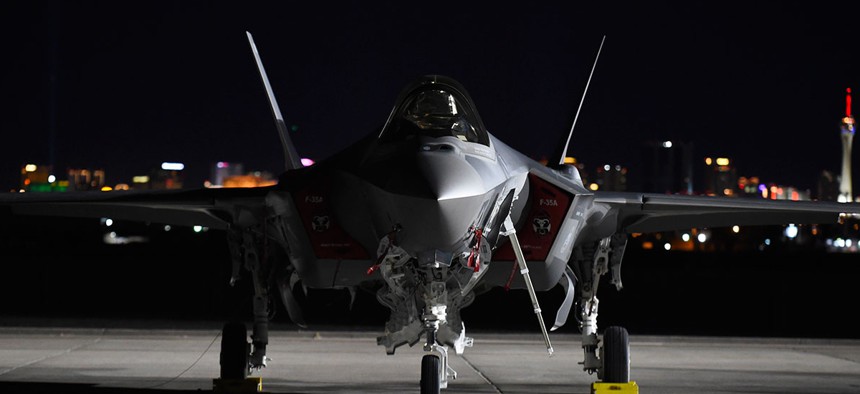
An F-35A Lightning II from the 388th Fighter Wing, Hill Air Force Base, Utah, sits on the flightline at Nellis AFB, Nev., during Red Flag 17-1, Jan. 24, 2017. Staff Sgt. Natasha Stannard/Air Force
US Air Force to Send F-35 to Fight ISIS … In a Few Years
The plane’s rotation schedule has the JSF making deployments to Europe and the Pacific before heading to the Middle East, a top Air Force general says.
The U.S. Air Force is planning to send the F-35 to the Middle East to join the bombing campaign against Islamic State militants in “a few years,” a top general said Friday.
Service officials plan to deploy the stealthy jet first to Europe and the Pacific region, Gen. Herbert “Hawk” Carlisle, the head of Air Combat Command, told the Defense Writers Group at a breakfast in Washington.
“Clearly, it would be very valuable in the fight against ISIS,” Carlisle said.
The general’s comments come just days before the Pentagon is supposed to present its plan to defeat ISIS to President Donald Trump. The comments signal that the Pentagon is still preparing to be engaged in the campaign against ISIS several years from now.
The F-35 “brings a lot of assets and a lot of attributes that would aid in the fight there,” Carlisle said.
He pointed to the plane’s advanced flight computer and its ability to give pilots a far more complete picture of the battlefield that the older A-10s, F-15s, F-16s, and F/A-18s flying in the campaign now. Like its fellow fifth-generation jet, the F-22 Raptor, the F-35 can attack targets in the air, on the ground, and through the electromagnetic spectrum. And it is a flying intelligence node whose advanced radar can suck up data about forces on the ground and other planes in the sky. The F-22 has been flying missions against ISIS since 2014.
“I think it [the F-35] would aid significantly in knowing where everything is and what’s going on in the battlespace,” Carlisle said.
The general pointed to the advanced surface-to-air missiles being used by Russian and Syrian forces that are “up and active.”
“If you look at portions of Syria, it’s a pretty dense surface-to-air threat,” he said.
The Air Force last year declared the F-35 ready for war , but the plane will not be able to use a full host of weapons and advanced sensors until it gets an upgraded software package for several years. As well, Aviation Week reported this week that the F-35 will not be able to strike moving targets until it gets a software upgrade. Project officials are reportedly looking to speed up integration of a laser-guided bomb that has its own, built-in navigation software as a gapfiller.
Earlier this year, the Marine Corps sent an F-35 squadron to Japan where it will be permanently based.
NEXT STORY: The Stubborn Problem of Ageism in Hiring







